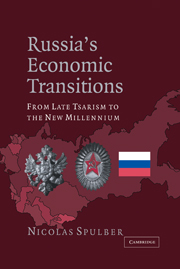Book contents
- Frontmatter
- Contents
- Figures and Tables
- Preface
- PART I THE TSARIST ECONOMIC TRANSITION
- PART II THE SOVIET ECONOMIC TRANSITION
- 10 The Socioeconomic Framework
- 11 The Transition Issues
- 12 The Economic Policies
- 13 The Problems of Agriculture
- 14 The Industrial Changes
- 15 Domestic and Foreign Trade
- 16 Money and Banking
- 17 State Finance
- 18 Overall View
- PART III THE POST-SOVIET ECONOMIC TRANSITION
- Index
16 - Money and Banking
Published online by Cambridge University Press: 03 December 2009
- Frontmatter
- Contents
- Figures and Tables
- Preface
- PART I THE TSARIST ECONOMIC TRANSITION
- PART II THE SOVIET ECONOMIC TRANSITION
- 10 The Socioeconomic Framework
- 11 The Transition Issues
- 12 The Economic Policies
- 13 The Problems of Agriculture
- 14 The Industrial Changes
- 15 Domestic and Foreign Trade
- 16 Money and Banking
- 17 State Finance
- 18 Overall View
- PART III THE POST-SOVIET ECONOMIC TRANSITION
- Index
Summary
The Monetary System
To what extent and in what ways did central decisions about income, capacity expansion, and manpower shape the state's financial plan, its budget, and the control of money and banking? From the beginning of the planning era, the financial plan took into account the scheduled expansion of the gross value of output and of its components, as well as the “sources” that this expansion would generate. It surveyed the obligations that these resources had to cover – obligations embodied in a capital construction plan and in a manpower plan – and specified in this connection the funds to be allocated to the banking system for short and long-term credits, for investments, for grants, as well as for the fiduciary means of circulation (bank notes). During the planning era, the centralized plans (and funds) managed by the Ministry of Finance were the state budget, the budget of the Social Security system, the state insurance budget, the currency and credit plans of the State Bank, and the balance of income and expenditure of the population. The decentralized funds – managed by the enterprises, collective farms, cooperatives, and their organs – concerned their respective activities and obligations. The government budget was the main instrument for implementing the financial plan, that is, the principal tool for centralizing and disbursing the country's financial resources. I will examine in detail the evolution and the structure of the budget – that is, of its receipts and expenditures – in the next chapter.
- Type
- Chapter
- Information
- Russia's Economic TransitionsFrom Late Tsarism to the New Millennium, pp. 248 - 258Publisher: Cambridge University PressPrint publication year: 2003



